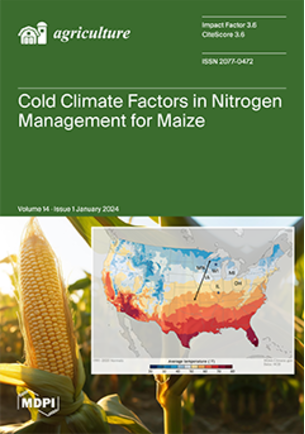Research and Design of a Hybrid DV-Hop Algorithm Based on the Chaotic Crested Porcupine Optimizer for Wireless Sensor Localization in Smart Farms
Q2 Agricultural and Biological Sciences
引用次数: 0
Abstract
The efficient operation of smart farms relies on the precise monitoring of farm environmental information, necessitating the deployment of a large number of wireless sensors. These sensors must be integrated with their specific locations within the fields to ensure data accuracy. Therefore, efficiently and rapidly determining the positions of sensor nodes presents a significant challenge. To address this issue, this paper proposes a hybrid optimization DV-Hop localization algorithm based on the chaotic crested porcupine optimizer. The algorithm leverages the received signal strength indicator, combined with node hierarchical values, to achieve graded processing of the minimum number of hops. Polynomial fitting methods are employed to reduce the estimation distance error from the beacon nodes to unknown nodes. Finally, the chaotic optimization crested porcupine optimizer is designed for intelligent optimization. Simulation experiments verify the proposed algorithm’s localization performance across different monitoring areas, varying beacon node ratios, and assorted communication radii. The simulation results demonstrate that the proposed algorithm effectively enhances node localization accuracy and significantly reduces localization errors compared to the results for other algorithms. In future work, we plan to consider the impact of algorithm complexity on the lifespan of wireless sensor networks and to further evaluate the algorithm in a pH monitoring system for farmland.基于混沌冠豪猪优化器的智能农场无线传感器定位混合 DV-Hop 算法的研究与设计
智能农场的高效运行有赖于对农场环境信息的精确监控,这就需要部署大量无线传感器。这些传感器必须与它们在田间的具体位置相结合,以确保数据的准确性。因此,高效、快速地确定传感器节点的位置是一项重大挑战。为解决这一问题,本文提出了一种基于混沌峰豪猪优化器的混合优化 DV-Hop 定位算法。该算法利用接收信号强度指标,结合节点分层值,实现对最小跳数的分级处理。采用多项式拟合方法减少信标节点到未知节点的估计距离误差。最后,设计了用于智能优化的混沌优化凤头豪猪优化器。仿真实验验证了所提算法在不同监测区域、不同信标节点比例和各种通信半径下的定位性能。仿真结果表明,与其他算法的结果相比,所提出的算法有效提高了节点定位精度,并显著降低了定位误差。在今后的工作中,我们计划考虑算法复杂性对无线传感器网络寿命的影响,并在农田 pH 值监测系统中进一步评估该算法。
本文章由计算机程序翻译,如有差异,请以英文原文为准。
求助全文
约1分钟内获得全文
求助全文
来源期刊

Agriculture
Agricultural and Biological Sciences-Horticulture
CiteScore
1.90
自引率
0.00%
发文量
4
审稿时长
11 weeks
期刊介绍:
The Agriculture (Poľnohospodárstvo) is a peer-reviewed international journal that publishes mainly original research papers. The journal examines various aspects of research and is devoted to the publication of papers dealing with the following subjects: plant nutrition, protection, breeding, genetics and biotechnology, quality of plant products, grassland, mountain agriculture and environment, soil science and conservation, mechanization and economics of plant production and other spheres of plant science. Journal is published 4 times per year.
 求助内容:
求助内容: 应助结果提醒方式:
应助结果提醒方式:


